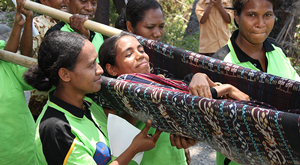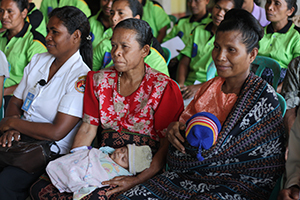In the far-flung villages of eastern Indonesia, two bamboo poles and a sarong can help save a woman and her baby's lives.
When Isabela Belita, 42, went into labour in remote Blopur Bola on Flores Island last July, her husband Pardianus began to panic. Isabela was pregnant with twins, and one baby's umbilical cord had started to emerge. This condition, called umbilical cord prolapse, cuts off or diminishes oxygen and blood supplies to the foetus. Prompt delivery of the baby is crucial to its survival.
Fortunately, Blopur Bola falls within the 'alert village network', or desa siaga, of nearby Wolonwalu village, one of 305 desa siagas supported by the Australia Indonesia Partnership for Maternal and Neonatal Health (AIPMNH).
Through the Desa Saiaga program, AIPMNH supports communities to build finance, family planning, transportation and blood donor networks that ensure women give birth safely at health facilities, rather than at home with an unskilled birth attendant.
Once Pardianus had informed the local traditional birth attendant, or dukun, of his wife's condition, the desa siaga network was mobilised. The dukun, Monika Mene, contacted the village midwife, who then contacted the midwife coordinator at the nearest health centre, Puskesmas Bola.
'In the past I might have handled this myself, but I've made an agreement with the midwife that all pregnant women must be brought to skilled health staff at the puskemas,' Monika said.
Knowing Puskesmas Bola's ambulance would take at least an hour to reach Wolonwalu, the dukun and four members of the desa siaga transportation network looped a sarong around two bamboo poles to create a stretcher. Blopur Bola is so remote that it cannot be reached by car, and the team carried Isabela for nearly an hour down steep paths and rocky hills to Wolonwalu.
According to Maria Marieta, the midwife coordinator at Puskesmas Bola, the mother's situation was critical.
'We decided to refer Isabela to the district hospital in the capital, Maumere, because of the various high-risk factors surrounding her pregnancy,' Maria said.
'Her last two children were breech, and being pregnant with twins at 42 and having umbilical cord prolapse, she needed to get to the hospital immediately.'
Two hours later, Isabela underwent a caesarean section conducted by doctors and midwives trained through the AIPMNH's Sister Hospital program. The twins weighed only 1.4kg and 1.2kg, but were delivered safely. Isabel received the service free of charge through the national Jampersal program, which guarantees all women in Indonesia free delivery in puskemas or hospital.
'Pardianus and I are so indebted to Monika, the midwives and the hospital for making sure that three lives were saved that day,' Isabel said.
Isabela's journey from a high-risk pregnancy in a remote village to safe delivery in a hospital shows how AIPMNH works at all points along the referral system. From creating ready teams in rural villages to establishing more responsive puskesmas to training on emergency and obstetric care at hospitals, the program ensures that women from even the most modest backgrounds have access to the services and facilities they and their babies deserve.
More information
Australia Indonesia Partnership for Maternal and Neonatal Health


